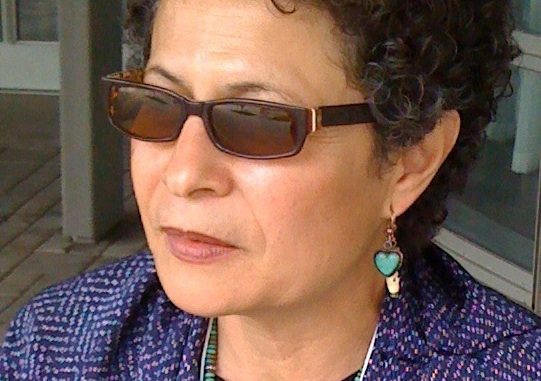
Paige Welch, Staff Writer |
On Thursday, March 23, Chicana author, activist, and educator Helena Maria Viramontes came to campus as part of the Red Dragon Reading Series, a program that brings a diverse selection of authors to campus every semester. Her outlook on literature was one that she described as “de-colonial.” She aims to rewrite history with the inclusion of Chicanx people, filling in what was left behind after the “amputation” of their spaces.
Viramontes began the reading with a brief introduction, stating that she grew up in a bookless home though she was curious and desperate for knowledge. Her two main sources of inspirations were, first, the set of World Encyclopedias her dad had purchased and displayed in the living room, and secondly, her sister’s Bible, which Viramontes would read in private so as not to get in trouble. But once she got a library card, she realized that every book within the building was potentially hers and that she seemingly had access infinite stories.
During the talk, Viramontes stated, “Of course I would look for information. Of course I would look for some truth.”
Truth-seeking seems to be at the heart of her world, because she does not tell politicized narratives but rather reveals stories about family and human beings living a Chicanx experience in America. This is how she manages to portray the powerful messages that add gritty honesty to her novels.
The first excerpt she read aloud was from her first novel, “Under the Feet of Jesus.” The excerpt compared language to tools, as she explores the tool box that belongs to a man named “Perfecto.”
Viramontes writes: “[He told me] names that gave meaning to the tools. [It was] a box of reason he took pride in.”
This line relates to the brief dialogue she had about language. Language is a tool of understanding that is oftentimes taken for granted by those who grow up speaking English as their first language. When asked how she juggles between English and Spanish in her work, Viramontes mentioned how she was punished for speaking Spanish at public school and therefore, was included within a generation of Chicanxs that could understand their native tongue, but not speak it. She subtly entwines different languages within the text so that the reader is not fully aware that something has changed, combining colonist and colonized into one entity.
The next reading was an excerpt from her second novel, “The Dog Came with Them.” Regarding this work, Viramontes told the audience about her experience of living in East L.A. as her neighborhood began to be “amputated” from the rest of the city. Highways were built around them as if to physically separate their communities from the West. This, combined with the memory of walking through graveyards of different cultures, inspired this novel, which took her 17 years to complete.
The last reading was from her third novel, “Graveyard Boys,” which she is still in the process of writing. This particular story was inspired by the names of the Mexican and other Chicanx soldiers that served in World War II and were never acknowledged in memoriam.
About this, she said, “I think about reinserting them into history.”
Each section of the novel explores a different conflict and has in-depth descriptions of the migrations people must take during their lives.
Viramontes says that she could never write just one story, especially since she grew up in such a large family. She wondered how it is possible for one story to be told in all of the classic Western literature when so many people were alive at the same time. Her work, though emotionally draining and painful to visit, aims to tell an alternative narrative of those that have been physically and socially isolated throughout history.
Leave a Reply